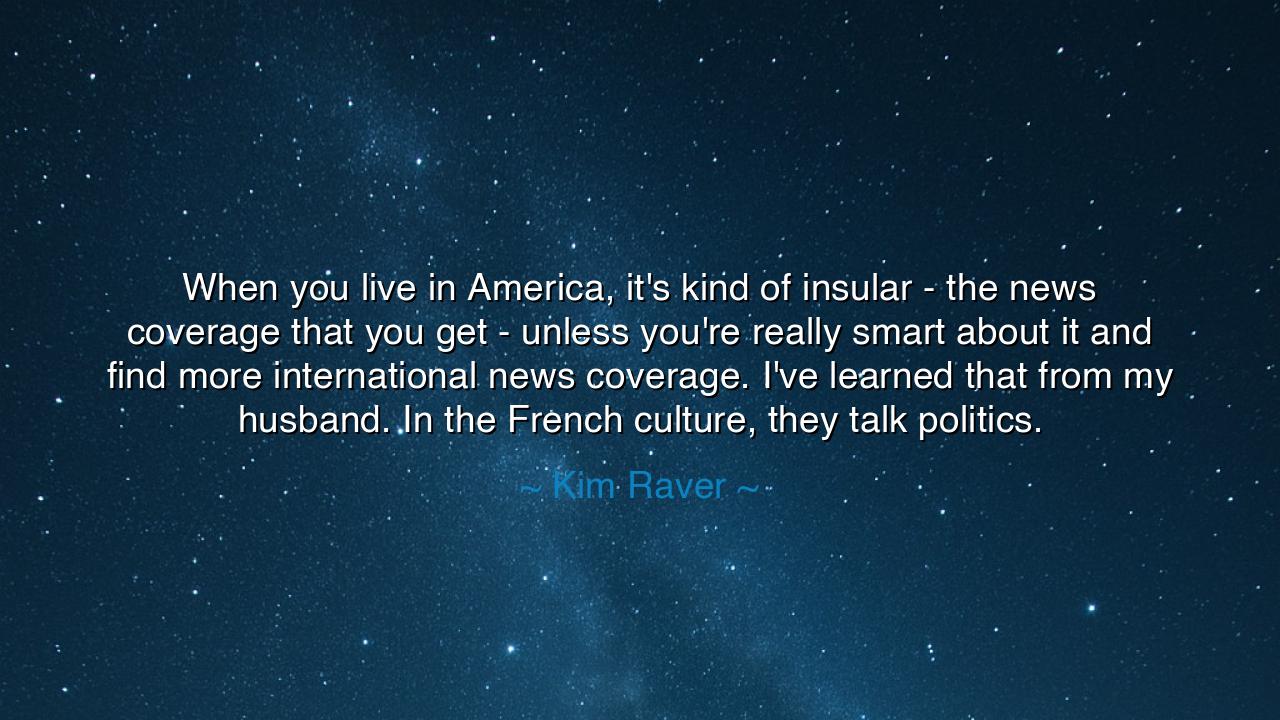
When you live in America, it's kind of insular - the news
When you live in America, it's kind of insular - the news coverage that you get - unless you're really smart about it and find more international news coverage. I've learned that from my husband. In the French culture, they talk politics.






"When you live in America, it’s kind of insular—the news coverage that you get—unless you’re really wise about it and seek broader international voices. I’ve learned that from my husband. In the French culture, they talk politics." Thus spoke Kim Raver, and though her words arise from her own life, they resound with an ancient truth: that every people risks blindness when it gazes only upon itself. To be insular is to live in a narrow chamber, mistaking the echo of one’s own voice for the sound of the world.
The ancients knew this danger well. The city-states of Greece often turned inward, caring only for their own pride and disputes, until greater empires swept upon them. But those who lifted their eyes beyond their borders, who learned from the ways of others, gained strength in wisdom. For the man who sees only his own reflection in the water knows little; but the man who listens to the rivers of many lands drinks of truth more deeply.
History bears witness in the fall of China’s Qing Dynasty. Proud and closed to the international world, the empire once strong became brittle, unable to comprehend the movements of foreign powers. Its insularity weakened it, until it was carved apart by those who looked beyond their own shores. Meanwhile, nations that studied other lands, that spoke of politics and world currents, endured and grew.
Raver, in speaking of France, reminds us that cultures differ not only in what they see but in how they speak. To discuss politics openly, to wrestle with ideas, is a sign of vitality. It sharpens the mind, strengthens the people, and prevents the slumber that comes with silence. The ancients would have called this discourse a duty, for a people that refuses to speak of power soon finds itself powerless.
Therefore, let this lesson be carried onward: do not live as one blindfolded within the walls of your own land. Seek the wider world, listen to many voices, and engage with politics, not to divide, but to understand. For the nation that looks only inward will wither, but the soul that seeks international truth and dares to speak of it will grow in wisdom. Thus the wise balance love of homeland with eyes open to the world.






Lloi
There’s also the emotional load of constant awareness. Global crises stack fast, and compassion fatigue is real. How do we stay informed without becoming numb—or using exhaustion as an excuse to look away? I’d appreciate a sustainable cadence: weekdays for headlines, one weekend block for deep context, and a personal “activation lane” where attention translates into action (donations, letters, local volunteering). Pair that with a media sabbath and a friend debrief to metabolize what we learn. Does this balance clarity with care?
KTnguyen pham khanh thuan
I worry that my feeds reward outrage and familiarity. If I wanted to pressure-test my worldview for a month, what experiments would you suggest? Maybe: switch my phone’s default language for one app, follow five foreign correspondents, add one public broadcaster and one diaspora outlet, and mute sensational keywords to surface policy detail. Then track mood and understanding with a tiny journal: What surprised me today? What did I mispredict? If my empathy map expands, keep the changes; if not, adjust.
VVVy Vy
There’s a culture question I can’t shake. Some circles treat political talk as impolite; others see it as civic hygiene. What norms make discussion energizing rather than toxic? I’d love a dinner-table playbook: time-box topics, ask each person to steelman the view they disagree with, ban gotchas, and end with “what evidence would change my mind?” Could you add two repair moves for when it goes sideways—naming feelings without blame and pausing to fact-check later—so curiosity survives the heat?
TTPham Thi Thuy
As a reader, I’m wondering how to turn “be less insular” into a routine rather than a vow. Could you sketch a simple news diet that balances depth and breadth? I’m imagining a daily 20-minute world scan (one non-U.S. paper, one wire), a weekly long-form piece from a region I rarely hear about, and a quarterly book to counter the hot-take churn. Add one “perspective swap” rule: for any big U.S. story, read at least two international editorials before forming an opinion. Would that triage actually shift my priors?